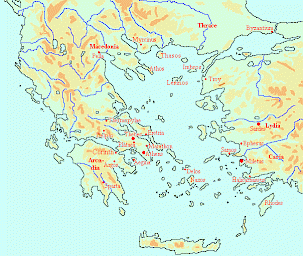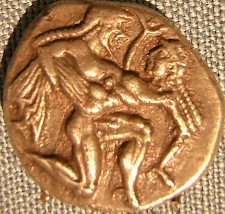Herodotus, bk 6, logos 18
Herodotus of Halicarnassus (c.480-c.429 BCE): Greek researcher, often called the world's first historian. In The Histories, he describes the expansion of the Achaemenid Empire under its kings Cyrus the Great, Cambyses, and Darius I the Great, culminating in Xerxes' expedition to Greece (480 BCE), which met with disaster in the naval engagement at Salamis and the battles at Plataea and Mycale. Herodotus' book also contains ethnographic descriptions of the peoples that the Persians have conquered, fairy tales, gossip, and legends.
Affairs in Greece (6.43-93)

The Persian king Darius had implored his god to grant him the punishment of the Athenians. After Ionia has been pacified, he sends an expedition to the Greek mainland under command of Mardonius, a member of the highest Persian nobility: he was the son of Gobryas, one of the seven conspirators (above) and the man who had persuaded Darius to return from Scythia (above). Mardonius' army adds the Macedonians to the list of the great king's subjects; his navy first attacks Thasos, but it caught in a violent northern gale when it rounds the Athos promontory. Three hundred ships are smashed up, and twenty thousand men are devoured by sea monsters.
After this failure, the Persian shah tries diplomatic means to subdue Greece; ambassadors demand earth and water, the usual token of submission. As we will see below, Sparta and Athens flatly refuse to consider the demands, but several cities are willing to surrender. Among the king's new subjects is the island Aegina, which causes great alarm in both Athens and Sparta.
The Spartan king Cleomenes launches a pre-emptive strike towards the unreliable island, but when he is away, the other Spartan king - the above mentioned Demaratus - makes trouble, and Cleomenes is forced to return home. At this point, Herodotus interrupts his tale and offers a fantastic explanation of the origin of the Spartan dual kingship.
The royal quarrel does not last long. Cleomenes spreads the rumor that Demaratus is an illegal child, bribes the oracle at Delphi to confirm the accusation, and ensures that his colleague goes into exile. Demaratus is succeeded by a strawman, Leotychides. The two kings invade Aegina, where they arrest the leaders of the pro-Persian party and send them to a prison in Athens.
When Cleomenes' machinations at Delphi become known, this king has to leave Sparta, too. However, by threatening to start a guerilla war in Arcadia, he brings about his return. But the king starts to behave very strange, and his family is forced to place the madman in the stocks. When he obtains a knife, he starts to mutilate himself until he dies. Herodotus suggests that the madness of the king who had bribed the Delphian oracle was a divine punishment. He adds a story about an earlier impiety of Cleomenes, who had once executed several soldiers in a sanctuary.
Comment
Although Herodotus presents Mardonius' expedition, which took place in 492 BCE, as a disaster, it had in fact been a great success. (It is likely that the ships sank when they were homeward bound.) Herodotus' mistake is that he thought that this expedition was directed against Greece, which was not Mardonius' objective. He added important provinces to the Persian Empire: both Macedonia and Thasos possessed gold mines and produced timber. Although he lost his fleet, Mardonius had been very successful. Darius was fully entitled to claim in his inscription at Naqš-e Rustam that he had conquered the Yaunâ takabarâ, the 'Greeks with sun hats', a reference to the Macedonian headwear.

Herodotus makes a tantalizing remarknote that Thasos had used its silver to build ships, which suggests that it had tried to become a sea power like Polycrates' Samos and Miletus had been, and Athens was to become (cf. the remark made above).
The Athenian and Spartan worries about the loyalty of Aegina are understandable: the island was located at the uncomfortably short distance of 25 kilometers from the Athenian harbor Phaleron. If Aegina had become a Persian naval base, the Athenian grain supply would have been seriously endangered, since Athens had begun to depend on imports from the Aegean Sea. Besides, the Persian navy would have been able to attack Athenian and Spartan territory wherever it choose.
The arrest of the leaders of the Aeginetan pro-Persian party took place in September 491; Cleomenes must have gone mad - if he was mad indeed, which is far from certain - immediately after his return to Sparta in December. In 488, he committed suicide - if he committed suicide. Many scholars suspect murder.
The conflict between Athens and Aegina was to last for several years. It offered the Athenian statesman Themistocles an excuse to build a large navy; he argued that the Athenian warships were outmoded and no match for the larger fleet of Aegina. In fact, the shipbuilding program was aimed against Persia, and Themistocles' navy was to save Greece in 480, as we will see below.